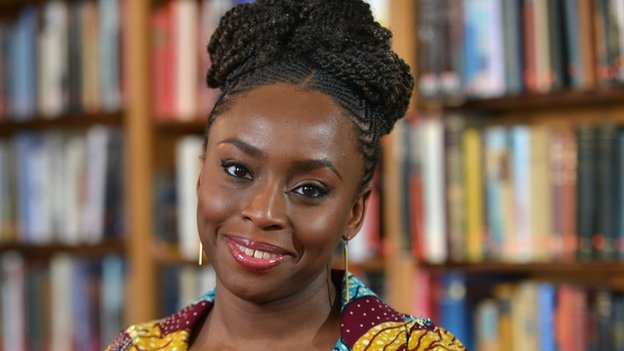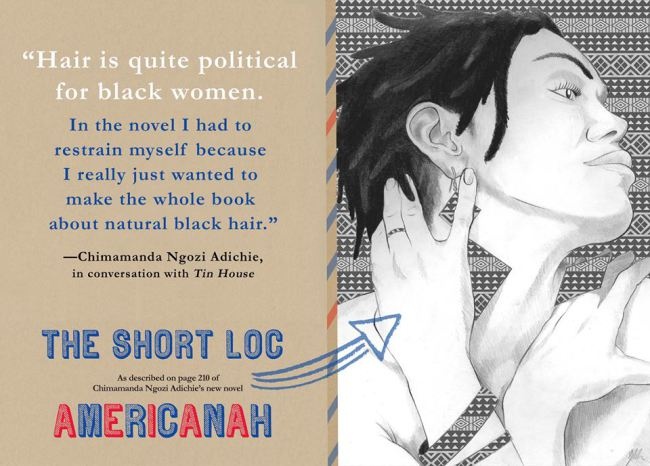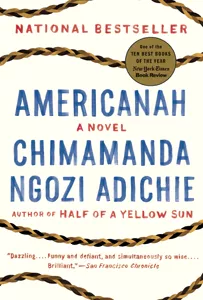Speciale
There is never just one story
“- What are you reading? – Kelsey turned to Ifemelu. || Ifemelu showed her the cover of the novel. She did not want to start a conversation … - Is it good? - || - Yes. - || - It’s a novel, right? What’s it about? - || Why did people ask “What is it about?” as if a novel had to be about only one thing. Ifemelu disliked the question; she would have disliked it even if she did not feel, in addition to her depressed uncertainty, the beginning of a headache.” Americanah, Anchor Books Edition, 2014, pp. 232-233
Chapter 18, pages 232-233 of Americanah, by Chimamanda Ngozi Adichie; written and published in America in 2013, and translated into Italian by Andrea Sirotti for Einaudi in 2014 (the pocket-sized edition was released a few months ago).
Chimamanda Ngozi Adichie was born in 1977 in Abba, Nigeria (a part of the former Biafra Republic), and grew up in the university city of Nsukka. She later left for the United States after gaining a scholarship. Americanah is her third novel, after Purple Hibiscus (originally published in 2003; Italian version by M.G. Cavallo, for Fusi Orari 2006, and Einaudi 2012), which won the Commonwealth Writers’ Prize for Best First Book in 2005; and Half of a Yellow Sun (2006; Italian version by S. Basso, for Einaudi 2008), a finalist for the National Book Critics Circle Award 2006, winner of the Orange Broadband Prize 2007, and winner of the International Nonino Prize 2009. The title – “half of a yellow sun” – refers to the emblem for Biafra, the rising sun. In 2009 she wrote The Thing Around Your Neck, a collection of short stories.

Chimamanda Ngozi Adichie
Americanah has won the National Book Critics Circle Award and many other prizes, including being listed in the New York Times' Ten Best Books of 2013.
It is a beautiful book, original and important. I will begin to describe what I mean by referring to the exclamation of annoyance from the beginning: “Why did people ask 'What is it about?' as if a novel had to be about only one thing.” Ifemelu, the protagonist of Americanah, has a reason to be annoyed because a novel never tells about just one unique matter; and, above all, doesn't just speak but expresses, about oneself and the story, by way of the written word. If we limit ourselves only to what takes place inside a novel, we will only talk of some of the reasons it excited us, that we loved about it, that made us think, that changed our outlook. And so, using precisely Americanah as an example, the meaning and value of this work doesn't involve only one thing that takes place over the course of the story, which can be summarized as follows.
We are in Nigeria, in the middle of the 1990s. Ifemelu and Obinze have fallen in love during school. They live without hope in a country under martial law. Ifemelu wins a scholarship and leaves for the United States, convinced that within a short few years Obinze can join her. But assimilation into the American society is difficult: it is as if Ifemelu discovers for the first time that she is black and what racism is. This realization is traumatic, leading to an emotional breakdown with Obinze and a denial of their story. Full societal integration never happens even throughout the years, remaining always a tiring fight, as she moves through her life, through other relationships, changing of cities and jobs. Soon she began an Internet blog called Raceteenth or Various Observations About American Blacks (Those Formerly Known as Negroes) by a Non-American Black:
The only reason you say that race was not an issue is because you wish it was not. We all wish it was not. But it’s a lie. I came from a country where race was not an issue; I did not think of myself as black and I only became black when I came to America. When you are black in America and you fall in love with a white person, race doesn’t matter when you are alone together because it’s just you and your love. But the minute you step outside, race matters. But we don’t talk about it. We don’t even tell our white partners the small thing that piss us off and the things we wish they understood better, because we’re worried they will say we’re overreacting or we’re being too sensitive. (Americanah, p. 359)
During this time, Obinze was unable to get a visa to enter America due to political tensions and security controls following 11 September. He was able to gain a six-month visa to go to the United Kingdom, where he lived in London illegally until he was discovered and extradited. After returning to Lagos, Obinze became a wealthy real estate agent, married and had a child. Thirteen years after her arrival in America at Princeton, Ifemelu broke off her relationship with a man named Blaine, and closed her blog that had made her famous. In an African salon she was “about to braid her hair for the journey home” (p. 9) because she had decided to return to Nigeria and didn't want to arrive as “Americanah” (the expression used to contemptuously describe those who returned to Nigeria “Americanized”). Ifemelu wrote to Obinze: her return and subsequent renewal of their relationship puts into play a possible new story.
What makes Americanah such a significant piece of work, however, and more than the sum total of all its parts, is the way in which it reinvents writing and constructing a story, asking us to take possession of it and make it ours. Particularly, it is the set boundaries of the space and time built from the written narrative that give life and meaning to its representation. In fact, the story is told in seven parts, consisting of fifty-five chapters: until the final chapter of part four (chapter forty-one), the story, which had begun with Ifemelu sitting in the salon getting her hair braided, is told in flashback: narratively spoken during the six hours spent in the salon from the viewpoint of Ifemelu (with the exception of Part Three, dedicated to Obinze), it tells of everything that happened during the last fifteen to sixteen years. The narrative tension built in the story is seen in a paradoxical equilibrium between an extensive and varied temporality and a unique set space (at least until Ifemelu leaves the salon). But it is not an insignificant place; it is a specific place where an African woman can have her hair done. The shop where Ifemelu, as she told in the first pages of the book, had come with a trip in front of her – leaving Princeton, taking a train and then a taxi – is not a simple scenario but one that is extremely symbolic. This is a shop that defines the female African identity, expressed in her hair. It is a female-only space, where women take center-stage and the narratives of black diversity are constructed and deconstructed. This can also be seen historically through the book Hair Story, Untangling the Roots of Black Hair in America (written by Ayana D. Byrd and Lori L. Tharps in 2001 and 2014), or in the Céline Sciamma film Bande de filles (2014) (released in Italy with an embarrassing translation of Black Diamond) where the character, a 16-year-old black girl, changes her hairstyle with each new experience in her life. Therefore, it is here, in the African salon while her hair is being transformed into the African style, that Ifemelu relives the last years of her Nigerian life before leaving for America, and her subsequent thirteen years of American life. Seen from this perspective, in this highly symbolic place, the story of Americanah is not a simple story of going home or, worse yet, a trip backwards, but the story of how Ifemelu – and the reader – explores and puts all the pieces together of how she made her decision to not just return to Nigeria but to actually live Nigeria. It is exactly this retelling of the past that moves the story forward, becoming in its telling a method of self-identification, a memory that has the ability to pave the way for the future, on both experiential and formal levels.

In both a thematic and structural sense, Ifemelu portrays, for four-fifths of the book, a fictional fate that she continually establishes and defines for its difference and dissociation: to remain in the center of something (also in the sense of self-identification) one must always be, simultaneously, apart from others. So in order to be in the salon she must leave Princeton where she had the scholarship. While in Nigeria, she was far from America, and vice-versa. And when she returned once again to Lagos, she understood that she had a stranger's viewpoint:
“Her generator is as big as my flat and it is completely noiseless,” Ranyinudo said. Did you notice the generator house on the side of the gate?”
Ifemelu had not noticed. And it piqued her. This was what a true Lagosian should have noticed: the generator house, the generator size. (Americanah, p. 485)In the same way as she had done with her hair, Ifemelu had tried to soften her identity, to conform, to adapt, to reinvent herself in order to be accepted:
Laura nodded knowingly. “Horrible, what’s going on in African countries.”
“How are you finding the U.S. so far?” Kimberly asked.
Ifemelu told her about the vertigo she had felt the first time she went to the supermarket; in the cereal aisle, she had wanted to get corn flakes, which she was used to eating back home, but suddenly confronted by a hundred different cereal boxes, in a swirl of colors and images, she had fought dizziness. She told this story because she thought it was funny; it appealed harmlessly to the American ego. (Americanah, p. 181)
She even found she had to contain her reactions so as not to appear “aggressive”:
“Your dog just ate my bacon, “ she told Elena, who was slicing a banana at the other end of the kitchen, the pieces falling into her cereal bowl.
“You just hate my dog.”
“You should train him better. He shouldn’t eat people’s food from the kitchen table.”
“You better not kill my dog with voodoo.”
“What?”
“Just kidding!” Elena said. Elena was smirking, her dog’s tail wagging, and Ifemelu felt acid in her veins; she moved towards Elena, hand raised and ready to explode on Elena’s face, before she caught herself with a jolt, stopped and turned and went upstairs. (Americanah, p. 187)
I just mentioned three scenes, using that word in a technical sense, because – although this is neither the only nor the best narrative device that can be used by an author – in many cases, it is this mimetic rather than diegetic mode that can help reveal the creative ability of a writer to appropriate and express some truth as a novelist and not as a sociologist. Americanah is not a story about Africa nor racial discrimination, but a fictional story. It is not intended to explain nor discuss, but to invent a fictional world that reveals itself through narration. To become literature, the symbolic violence she is subjected to must be lived, both by her and by the reader.
In that sense, I believe that Chimamanda Ngozi Adichie, in writing Americanah, wanted to confront three issues she perceived as urgent but which she in fact reinvented and treated in a literary sense as the author of a novel.
Above all, both the need and choice to describe Africa in a non-metaphorical way (“They’ll believe all kinds of shit about Africa,” Americanah, p. 160) echoes the rich yet still fairly unknown Nigerian tradition of reflections on the orientalistic views of Africa. Chinua Achebe (1930-2013), author of Things Fall Apart (1958) (translated into fifty languages and read by millions; now available in Italy in a rare 2002 Loescher edition), speaks of this tradition when he described Africa: “Africa as setting and backdrop which eliminates the African as human factor. Africa as a metaphysical battlefield devoid of all recognizable humanity, into which the wandering European enters at his peril.” (An Image of Africa: Racism in Conrad's "Heart of Darkness").
Wole Soyinka also speaks to this tradition in a conversation with Alessandra Di Maio published by doppiozero (Of Africa, 2012), or when writing about Eurocentric “fictional” views of Africa (Bompiani, p. 50, translated by Alberto Cristofori; the introduction to this work can be found here).
It is mainly through Obinze's voice in Americanah that the idea of Africa as the subject of reflection emerges:
“When I started in real estate, I considered renovating old houses instead of tearing them down, but it didn’t make sense. Nigerians don’t buy houses because they’re old. A renovated two-hundred-year-old mill granary, you know, the kind of thing Europeans like. It doesn’t work here at all. But of course it makes sense because we are Third Worlders and Third Worlders are forward-looking, we like things to be new, because our best is still ahead, while in the West their best is already past and so they have to make fetish of that past.” (Americanah, pp. 538-539)
“Are your potatoes the frozen imported ones, or do you cut and fry your potatoes?”
The waiter looked offended. “It is the imported frozen ones.”
As the waiter walked away, Ifemelu said, “Those frozen things taste horrible.”
“He can’t believe you’re actually asking for real potatoes,” Obinze said drily. “Real potatoes are backward for him. Remember this is our newly middle-class world. We haven’t completed the first cycle of prosperity, before going back to the beginning again, to drink milk from the cow’s udder.” (Americanah, p. 548)
A second aspect seen in Americanah is that of the attention given in the novel to the image of racism. Once again we will let the text speak by recalling a scene that takes place among African Americans: the hostess, sister of a boyfriend of Ifemelu, is telling about when a white Englishman felt sorry for a white woman abandoned by her husband and empathized with her sorrow – not of the existence of another relationship but of the discovery of a black rival:
“Maybe you should turn it into a novel, “ Maribelle said.
“Are you kidding me?” Shan asked, slightly drunk, slightly dramatic, and now sitting yoga-style on the floor. “You can’t write an honest novel about race in this country. If you write about how people are really affected by race, it’ll be too obvious. Black writers who do literary fiction in this country, all three of them, not the ten thousand who write those bullshit ghetto books with the bright covers, have two choices: they can do precious or they can do pretentious. When you do neither, nobody knows what to do with you. So if you’re going to write about race, you have to make sure it’s so lyrical and subtle that the reader who doesn’t read between the lines won’t even know it’s about the race. You know, a Proustian meditation, all watery and fuzzy, that at the end just leaves you feeling watery and fuzzy.”
“Or just find a white writer. White writers can be blunt about race and get all activist because their anger isn’t threatening,” Grace said. (Americanah, pp. 416-417)
Contrary to the character of Shan, the author of Americanah decided to speak directly about the idea of racism, exactly as the novel's protagonist did with her Blog through her posts. Some examples of this are: To my Fellow Non-American Blacks: in America, You Are Black, Baby (p. 273), Obama Can Win Only If He Remains the Magic Negro (p. 398), Traveling While Black (p. 410). Or through dialogues or descriptions of everyday situations (a delivery person who rings the doorbell and relaxes only upon discovery that the black woman who answered the door is not the homeowner but a babysitter, and is an inferior, p. 204). Thanks to all of these aspects, Americanah's narrative gives light to the imperceptible banality of fierce racism, sometimes almost with irony: "You look beautiful,” said a guy with an unabashedly brilliant smile. “African women are beautiful, especially the Ethiopians" (p. 209); or when Obinze, in London, goes to dinner at the home of his school friend, Emenike, who married a white woman:
“Shall we eat, boys and girls?” She picked up one of the plates and examined it.
“I love these plates. Georgina and Emenike are never boring, are they?” Hannah said.
“We bought them from this bazaar in India,” Emenike said. “Handmade by rural women, just so beautiful. See the detail at the edges?” He raised one of the plates.
“Sublime,” Hannah said, and looked at Obinze.
“Yes, very nice,” Obinze mumbled. Those plates, with their amateur finishing, the slight lumpiness of the edges, would never be shown in the presence of guests in Nigeria. He still was not sure whether Emenike had become a person who believed that something was beautiful because it was handmade by poor people in a foreign country, or whether he had simply learned to pretend so. (Americanah, pp. 334-335)
Finally, a third theme seen continuously in Americanah is that of the construction of textual and narrative perspectives that break down traditional story telling. It tells of the ordinary lives of often-invisible people in traditional Western stories: for example, blacks, women, emancipated blacks, slaves who once freed became educated and wealthy, or blacks who scrub toilets, living in London as illegal immigrants despite being children of university professors. Women who study and free themselves, who work and therefore take center-stage in the narrative instead of having only the title of mother, daughter, wife, parent, child, or lover of the novel's protagonist. The stories are important because through them we see our place in the world. The creation of dynamic fictional universes, able to always tell a different story, thus becomes an opportunity for freedom that concerns all of us.
In this sense, Americanah speaks on the same subjects to which Ngozi Adichie dedicated two “Ted Talks” which reached worldwide fame: the first is The dangers of a single story (2009), and the second We should all be feminists (2013), which was published last April by Einaudi and became the subject of a song by Beyoncé. The critique of racism and feminism are not in fact two issues thrown together casually: in both situations the creative redemption arises from the possibility of a perceptual shift, namely the transition from a unique storyline to a plurality of alternative, different stories hidden by hegemonic narratives or aligning themselves – both aesthetically and ideologically – to empowering stories that belong to others. The famous idea of "suspension of disbelief", seen from a deconstructive perspective, is no longer merely a literary question, because the presence of narratives that speak to and about everyone concerns not only the scope of fictional credibility but gives plausibility to the existence of a world in which all life would be given the chance to reinvent itself. And maybe even to have a story that is not about only one thing.
Translated by Laura Giacalone
With the support of 









